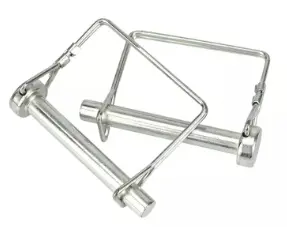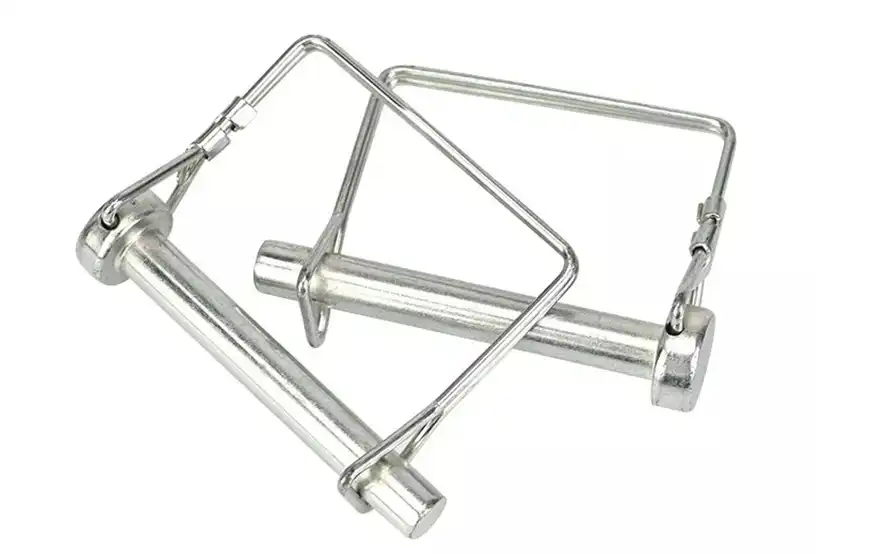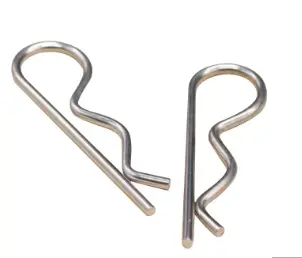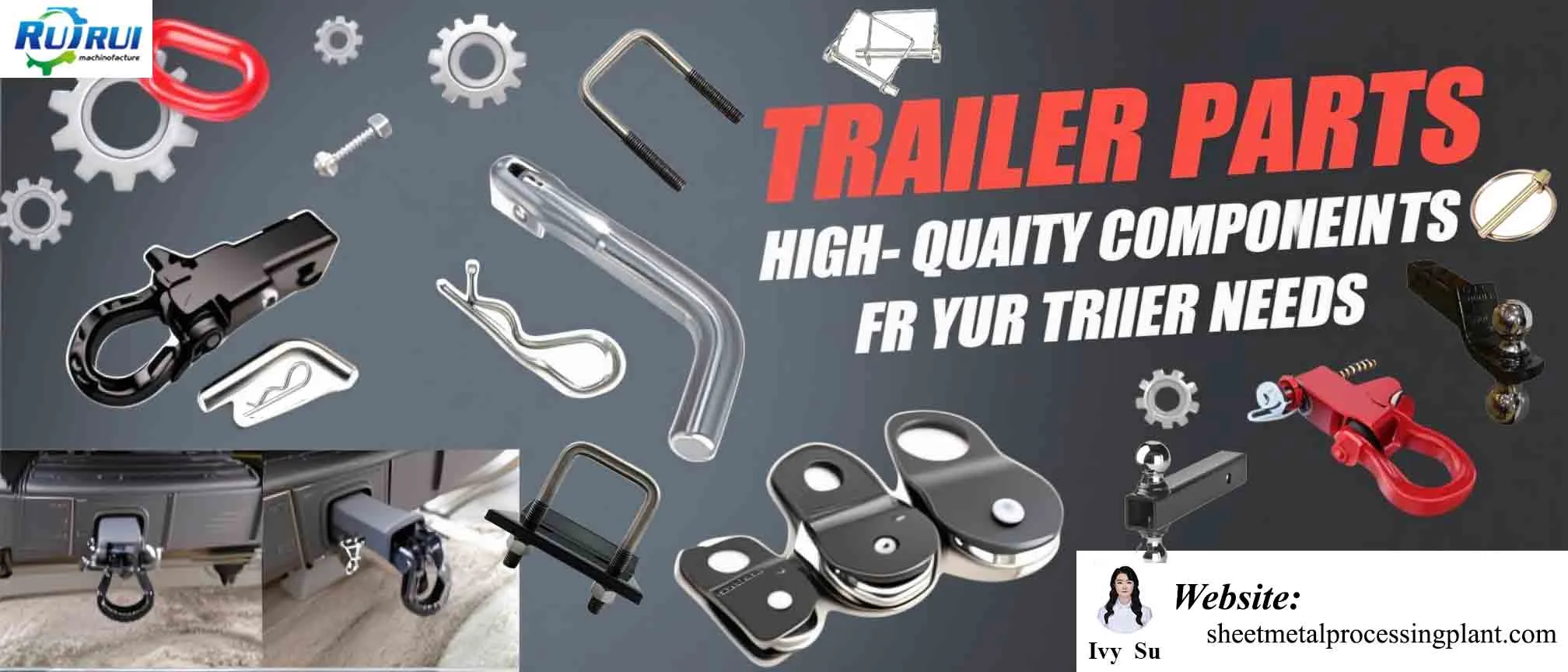How a Custom-Sized Hitch Pin Ensures Perfect Fit and Maximum Safety?
2025-10-28 15:28:43
Picture this: you're hauling a heavy trailer on a busy highway when suddenly your hitch connection fails because of an ill-fitting pin. The consequences can be catastrophic. A Custom-Sized Hitch Pin eliminates this nightmare scenario by providing precision engineering that matches your exact receiver specifications, ensuring your trailer stays securely attached under all conditions. This critical component transforms towing from a risky gamble into a safe, reliable operation.

Understanding the Critical Role of Custom-Sized Hitch Pins
The foundation of safe towing begins with understanding why standard, one-size-fits-all solutions fall short in real-world applications. When commercial fleets, construction companies, and agricultural operations rely on generic hitch pins, they unknowingly introduce dangerous variables into their towing operations. A Custom-Sized Hitch Pin addresses these concerns by delivering engineered precision that accounts for your specific vehicle configuration, load requirements, and operational conditions. Modern towing demands have evolved far beyond simple recreational use. Today's heavy-duty applications involve transporting construction equipment weighing tens of thousands of pounds across challenging terrains, hauling agricultural machinery through rough fields, and moving commercial goods over long distances. Each scenario presents unique stress factors that generic pins simply cannot accommodate safely. The receiver trailer hitch pin serves as the single point of connection between towing vehicle and load, making its proper sizing absolutely critical for operational safety.
-
Why Standard Hitch Pins Create Safety Vulnerabilities?
Standard hitch pins available at retail outlets typically come in only two diameter options, which creates significant problems for specialized applications. When a pin diameter doesn't match precisely with your receiver tube dimensions, even minimal play or looseness translates into dangerous movement during transit. This movement causes accelerated wear on both the pin and receiver, gradually compromising the connection integrity over time until catastrophic failure occurs. The diameter tolerance becomes especially critical when considering load dynamics during transport. Every bump, turn, and braking action creates forces that stress the hitch pin connection. A properly fitted Custom-Sized Hitch Pin distributes these forces evenly across its surface area, while an oversized or undersized standard pin creates concentrated stress points that accelerate material fatigue and increase failure risk exponentially. Material composition presents another critical factor often overlooked with standard pins. Mass-produced pins frequently use lower-grade steel alloys that sacrifice strength for cost savings. These inferior materials may appear adequate under normal conditions but prove inadequate when subjected to the sustained heavy loads and harsh environmental conditions typical in commercial, agricultural, and construction applications. The Hitch Pin you select must feature high-grade steel construction with appropriate heat treatment to ensure reliable performance.
-
The Engineering Precision Behind Custom Manufacturing
Custom-sized manufacturing processes employ advanced metallurgical techniques that transform raw materials into precision-engineered safety components. The process begins with careful material selection, choosing high-grade steel alloys specifically formulated to deliver superior tensile strength, shear resistance, and fatigue life. These specialized alloys undergo rigorous heat treatment processes that optimize their molecular structure for maximum load-bearing capacity. Precision machining ensures every Custom-Sized Hitch Pin meets exacting dimensional specifications. Computer-controlled equipment manufactures pins with tolerances measured in thousandths of an inch, guaranteeing perfect fit within your specific receiver tube dimensions. This manufacturing precision eliminates the dangerous play and movement associated with standard pins while ensuring smooth insertion and removal for operational efficiency. Surface treatment processes further enhance performance and longevity. Advanced coating technologies like electroplating, powder coating, and specialized rust-resistant finishes protect the pin from corrosion caused by moisture, road salt, and chemical exposure. These protective layers extend service life significantly compared to basic zinc-plated standard pins, reducing replacement costs and eliminating the risk of corrosion-induced failure during critical operations.
Matching Custom-Sized Hitch Pins to Your Specific Application
Different industries and applications demand different performance characteristics from their towing equipment. Understanding these specific requirements enables proper specification of a Custom-Sized Hitch Pin that delivers optimal safety and performance for your particular use case. Commercial fleet operations, construction equipment transport, agricultural machinery towing, and recreational vehicle applications each present distinct challenges requiring tailored solutions.
-
Commercial Fleet Requirements and Specifications
Commercial transportation operations face unique challenges that demand the highest levels of reliability and safety. Fleet managers must consider not only the immediate load requirements but also the cumulative effects of continuous daily use across diverse environmental conditions. A receiver trailer hitch pin serving commercial applications must withstand constant connection and disconnection cycles while maintaining structural integrity under varying load conditions. Weight capacity calculations for commercial applications must account for gross trailer weight, tongue weight, and dynamic load factors encountered during normal operations. High-quality Custom-Sized Hitch Pins designed for commercial service typically feature weight capacities ranging from 10,000 to 30,000 pounds depending on diameter and material specifications. These robust designs incorporate advanced locking mechanisms that prevent accidental disconnection even under severe vibration and impact conditions common in commercial transport. Fleet maintenance considerations also influence Custom-Sized Hitch Pin selection. Commercial operations benefit from pins featuring easy-grip handles or integrated removal tools that facilitate quick hitching and unhitching without requiring additional equipment. Corrosion-resistant coatings become essential for fleets operating in coastal regions or areas using road salt, where standard pins would quickly deteriorate and require frequent replacement.
-
Construction and Heavy Equipment Applications
Construction sites present some of the most demanding conditions for towing equipment. Heavy machinery transport involves extreme loads combined with rough terrain navigation that generates substantial stress on every connection point. The Hitch Pin securing construction equipment trailers must deliver exceptional shear strength to resist the sideways forces generated when maneuvering over uneven ground, up steep grades, or through muddy conditions. Custom sizing becomes particularly critical for construction applications because equipment trailers often feature non-standard receiver tube dimensions designed to accommodate specialized mounting configurations. Standard pins simply cannot provide secure connections in these modified receivers, creating dangerous situations where trailer separation could result in equipment damage, injury, or fatality. Properly specified Custom-Sized Hitch Pins eliminate this risk by matching exact receiver dimensions while providing appropriate load ratings for heavy equipment transport. Locking mechanism design deserves special attention for construction applications. Spring-loaded ball detent systems provide quick-release convenience for frequent hitching operations while maintaining secure retention under load. More robust applications may require threaded locking systems or keyed security features that prevent unauthorized trailer removal and ensure the receiver trailer hitch pin remains firmly seated throughout transport despite severe vibration and impact conditions.

Quality Standards and Safety Certifications
Manufacturing excellence requires adherence to rigorous quality standards throughout the production process. Leading manufacturers implement comprehensive quality management systems certified to international standards including ISO 9001, ensuring consistent product quality and traceability. These quality systems mandate detailed documentation of material specifications, manufacturing processes, and inspection results for every Custom-Sized Hitch Pin produced.
-
Material Testing and Load Verification
Responsible manufacturers conduct extensive material testing to verify their products meet or exceed stated performance specifications. Tensile strength testing subjects sample pins to gradually increasing loads until failure, confirming the material can safely handle rated capacities with appropriate safety margins. Shear testing evaluates the pin's resistance to sideways forces that occur during normal towing operations, particularly important for applications involving frequent turns or uneven terrain navigation. Fatigue testing simulates years of operational use by subjecting pins to repeated load cycles that replicate real-world stress patterns. This accelerated testing reveals potential weaknesses that might not appear during short-term use but could lead to premature failure after extended service. Only Custom-Sized Hitch Pins that successfully complete rigorous fatigue testing should be trusted for critical commercial, construction, or agricultural applications where reliability directly impacts operational safety. Environmental testing ensures pins maintain their performance characteristics across the full range of operating conditions they may encounter. Temperature cycling verifies dimensional stability and material properties remain consistent from extreme cold to high heat. Corrosion resistance testing exposes coated pins to salt spray and chemical agents to validate protective finishes provide long-term protection against environmental degradation. These comprehensive testing protocols separate quality-engineered products from inferior alternatives.
-
Certification and Compliance Documentation
Professional procurement requires proper documentation verifying product compliance with applicable safety standards and regulations. Reputable manufacturers provide detailed certification documents including material certifications, dimensional inspection reports, and load test results for each production batch. This documentation enables fleet managers and safety officers to maintain proper records demonstrating due diligence in equipment selection and maintenance. Industry-specific standards may apply depending on your application and jurisdiction. Transportation industry regulations often mandate specific requirements for towing equipment used in commercial service. Agricultural operations may need to comply with farm safety regulations governing equipment transport. Understanding and documenting compliance with these standards protects your organization from liability while ensuring your Custom-Sized Hitch Pin selections meet all applicable safety requirements. Quality assurance extends beyond initial manufacturing to encompass ongoing inspection and maintenance protocols. Establishing regular inspection schedules for your Hitch Pin inventory enables early detection of wear, corrosion, or damage before these issues compromise safety. Detailed inspection records document proper maintenance practices and provide valuable data for optimizing replacement intervals and refining equipment specifications based on actual field experience.
Customization Options for Specialized Requirements
Beyond standard dimensional customization, advanced manufacturers offer extensive options for tailoring hitch pins to unique operational requirements. These customization capabilities enable solutions for challenging applications that standard products simply cannot address effectively. Whether you need special dimensions to fit unconventional receiver designs, higher weight capacities for extreme loads, or unique locking mechanisms for enhanced security, comprehensive customization services deliver precisely engineered solutions.
-
Dimensional Customization Capabilities
Standard receiver tubes typically measure 1.25, 2, 2.5, or 3 inches, but many specialized applications require custom receiver dimensions that fall outside these common sizes. Custom manufacturing services accommodate any receiver tube dimension, producing pins in non-standard diameters and lengths that provide perfect fit regardless of your specific configuration. This dimensional flexibility proves essential for retrofitted equipment, imported machinery using metric specifications, or custom-fabricated towing systems. Length customization addresses variations in receiver tube wall thickness and mounting depth requirements. While standard pins work for common automotive applications, commercial and industrial equipment often features heavier receiver tube construction requiring longer pin lengths to fully penetrate the receiver and provide adequate engagement. Custom-length pins ensure complete penetration while avoiding excessive protrusion that could create clearance issues or snagging hazards during operations. Thread specifications and locking mechanism positioning can be customized to accommodate specific installation requirements. Some applications benefit from fine-thread specifications for more secure locking action, while others require coarse threads for easier operation with gloved hands in cold conditions. The receiver trailer hitch pin can be manufactured with locking mechanisms positioned for optimal accessibility based on your particular vehicle and trailer configuration.
-
Material Selection for Special Environments
Operating environment significantly influences appropriate material selection for your Custom-Sized Hitch Pin. Marine applications demand specialized corrosion-resistant alloys or advanced coating systems that withstand constant saltwater exposure without degradation. Chemical processing facilities may require pins manufactured from stainless steel or other non-reactive materials compatible with the chemicals they may contact during operations. High-temperature applications such as hot material transport or equipment operating near furnaces require materials that maintain strength and dimensional stability under elevated temperatures. Specialized high-temperature alloys prevent thermal expansion issues while resisting oxidation and heat-related degradation. Conversely, extreme cold climate operations benefit from materials selected for low-temperature toughness that resist brittle fracture when subjected to impact loads in freezing conditions. Weight optimization through material selection provides benefits for applications where reducing vehicle weight improves fuel efficiency or payload capacity. Advanced aluminum alloys and titanium offer exceptional strength-to-weight ratios, enabling production of lightweight Custom-Sized Hitch Pins that maintain necessary load capacity while reducing overall vehicle weight. These premium materials particularly benefit recreational vehicle applications where every pound of weight reduction contributes to improved performance and fuel economy.

Professional Installation and Maintenance Practices
Even the highest-quality Custom-Sized Hitch Pin delivers suboptimal performance without proper installation and maintenance. Establishing comprehensive protocols for initial installation, regular inspection, and preventive maintenance maximizes safety while extending service life. These practices prove especially critical for commercial operations where equipment downtime directly impacts profitability and safety failures expose organizations to significant liability.
-
Proper Installation Procedures
Correct installation begins with thorough cleaning of both the receiver tube and the Hitch Pin itself. Accumulated dirt, debris, and corrosion can prevent proper seating and create interference that weakens the connection. Using appropriate cleaning tools and lubricants ensures smooth insertion while preventing galling or seizing that could make pin removal difficult or impossible during later service. Alignment verification ensures the pin passes through all mounting holes without forcing or binding. Attempting to force a misaligned pin damages both the pin and receiver tube, creating wear patterns that accelerate future deterioration. Taking time to properly align all components before insertion prevents this damage while ensuring the receiver trailer hitch pin seats completely for maximum load-bearing contact. Locking mechanism engagement requires verification that all retention features function correctly and secure the pin against accidental removal. Testing the lock by attempting to withdraw the pin confirms proper engagement. For applications involving valuable cargo or equipment, secondary retention devices such as safety cables or chains provide redundant protection against the unlikely event of primary connection failure.
-
Inspection and Maintenance Protocols
Regular inspection schedules appropriate to your operational intensity identify developing issues before they compromise safety. High-utilization commercial operations benefit from daily visual inspections checking for obvious damage, excessive wear, or corrosion. More detailed weekly or monthly inspections using measurement tools verify the pin maintains proper dimensions without excessive wear that could affect load-bearing capacity. Wear patterns observed during inspections provide valuable information about operational stresses and potential problems with receiver tube condition or alignment. Uneven wear indicates misalignment issues requiring correction, while excessive wear at specific locations may reveal loading conditions exceeding design parameters. This diagnostic information enables proactive corrections that prevent more serious problems while optimizing equipment specifications for actual operational requirements. Corrosion management proves especially important for equipment operating in harsh environments. Regular cleaning removes corrosive contaminants before they penetrate protective coatings. Applying appropriate lubricants or protective coatings to cleaned surfaces provides additional corrosion resistance. For Custom-Sized Hitch Pins showing early corrosion signs, intervention with wire brushing and protective coating reapplication often arrests deterioration and extends useful service life considerably.
Cost-Benefit Analysis of Custom Solutions
While Custom-Sized Hitch Pins typically involve higher initial investment compared to standard retail alternatives, comprehensive cost analysis reveals significant long-term value. Evaluating total ownership costs including purchase price, replacement frequency, downtime expenses, and safety risk exposure demonstrates that custom solutions deliver superior return on investment for most commercial, construction, and agricultural applications.
-
Direct Cost Savings Through Extended Service Life
Premium materials and precision manufacturing that define quality Custom-Sized Hitch Pins directly translate to extended service life compared to standard alternatives. Where generic pins might require replacement annually or even more frequently under demanding conditions, properly specified custom pins often deliver multiple years of reliable service. This extended lifespan reduces both the direct cost of replacement pins and the indirect costs associated with equipment downtime and maintenance labor. Reduced wear on receiver tubes provides another significant cost benefit. Ill-fitting standard pins accelerate receiver tube wear through excessive movement and concentrated loading. The resulting damage eventually necessitates expensive receiver tube repair or replacement. Properly fitted custom pins distribute loads evenly and eliminate damaging movement, preserving receiver tube integrity and avoiding these substantial repair costs. Inventory management costs decrease when operations standardize on Custom-Sized Hitch Pins precisely matched to their equipment. Rather than maintaining diverse inventories of various standard sizes with uncertain compatibility, custom solutions enable stocking exact replacements with confidence they will fit and perform correctly. This targeted inventory approach reduces capital tied up in parts while eliminating the risk of discovering available stock doesn't fit when replacement becomes necessary.
-
Risk Mitigation and Liability Protection
Safety improvements delivered by properly engineered Custom-Sized Hitch Pins provide immeasurable value through accident prevention. A single serious towing accident involving injury or property damage can generate costs far exceeding the cumulative expense of equipping an entire fleet with premium custom pins. Beyond direct accident costs, organizations face potential liability claims, insurance premium increases, regulatory penalties, and reputation damage that compound financial impacts. Demonstrating proper equipment specification and maintenance practices protects organizations in the unfortunate event accidents occur. Documentation showing Custom-Sized Hitch Pin selection based on proper engineering analysis, supported by regular inspection and maintenance records, establishes due diligence that can significantly reduce liability exposure. This documentation proves especially valuable for commercial operations subject to regulatory oversight and potential litigation following accidents. Operational confidence derived from reliable equipment enables business opportunities that would be too risky with questionable standard pins. Commercial transport operations can confidently bid on contracts involving valuable cargo or challenging delivery conditions when equipped with properly specified Custom-Sized Hitch Pins. Construction firms can undertake projects requiring heavy equipment transport across difficult terrain without excessive safety concerns compromising productivity and profitability.

Conclusion
A Custom-Sized Hitch Pin represents a critical investment in operational safety and reliability. Precision engineering matched to your specific requirements eliminates the dangerous compromises inherent in standard solutions while delivering long-term cost savings through extended service life and reduced liability exposure.
Cooperate with Qingdao RUIRUI Machinary Co., LTD.
Partner with a trusted China Custom-Sized Hitch Pin manufacturer that delivers excellence. As a leading China Custom-Sized Hitch Pin factory and China Custom-Sized Hitch Pin supplier, Qingdao RUIRUI Machinery offers High Quality Custom-Sized Hitch Pin products with China Custom-Sized Hitch Pin wholesale pricing. Our Custom-Sized Hitch Pin for sale features competitive Custom-Sized Hitch Pin price backed by ISO 9001, ISO 14001, and OHSAS 18001 certifications. With eight automated production lines manufacturing 130,000 pieces annually, we provide OEM support, short delivery times, and comprehensive technical assistance. Our metal fabrication expertise includes stamping, CNC machining, laser cutting, and advanced surface treatments including powder coating, plating, and anodizing. Contact us today at info@qdkshd.com for custom solutions tailored to your fleet's specific requirements and experience manufacturing excellence that has served customers across 80 countries worldwide.
References
1. "Trailer Hitch Safety Standards and Load Requirements" by the Society of Automotive Engineers (SAE), Technical Committee on Towing Equipment
2. "Material Specifications for Heavy-Duty Towing Components" by the American Society for Testing and Materials (ASTM), Standards Division for Steel Products
3. "Commercial Vehicle Towing Equipment: Selection, Installation, and Maintenance Guidelines" by the Commercial Vehicle Safety Alliance (CVSA), Technical Standards Working Group
4. "Engineering Analysis of Hitch Pin Failure Modes and Prevention Strategies" by the National Institute for Occupational Safety and Health (NIOSH), Industrial Safety Research Laboratory
Send Inquiry
You may like
